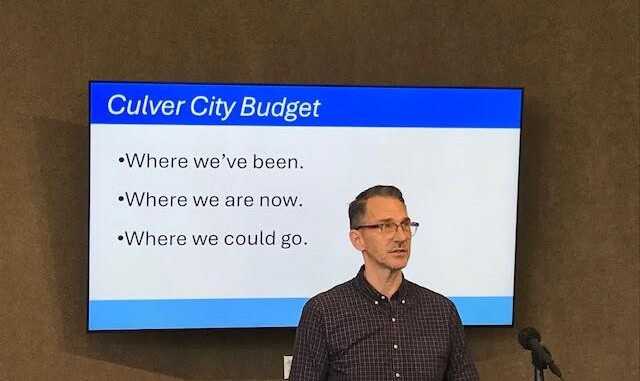
The Rotunda Room at the Vets Building was filled almost to capacity on April 26, 2025 for a Budget Town Hall offered by the local community group Our Culver. This was the second year for Our Culver to offer the discussion, and offering child care on site helped to make the event workable for many parents in the crowd.
It was a crowd; Kenny Stevenson, the MC, offered that spending a sunny Saturday afternoon talking about government financial policy might not be everyone’s idea of a good time, but the numbers seemed to indicate that plenty of people felt it was the best option.
Stevenson then introduced Freddy Puza. Vice Mayor Puza began his remarks by noting that he was not there to represent the city in any official capacity, but simply as himself. He then brought up the budget basics; looking at revenue, considering expenses, and highlighting the structural deficit that has been forecast.
A projected $35 million shortfall is looming over the current budget process, largely due to pension obligations.
Noting that it is a structural deficit, many at the city have emphasized that it is not due to any one-time expenditure. At an April city council meeting, City Manager John Nachbar stated that “This isn’t about purchasing the gun store, or supporting affordable housing. This is about long term, ongoing expenses.” Operating expenses often translate directly to salaries; any city’s most expensive asset is people.
Our Culver’s Jeanne Black gave a thorough presentation of numbers, taken from the publicly available city data from Chief Financial Officer Lisa Sogher’s office. She said “Every number you see here is from our Finance Department, and they do an excellent job of being transparent.”
Presented as a Power Point, the long shadow of Prop 13 was observed, and Black explained how capping property taxes had forced the city to be much more reliant on sales tax.
Culver City’s revenue stream, a total of $167.8 million, was broken out into categories. Sales tax brings in 25% of the General Fund, and was projected to be $41.2 million dollars. Next was Business tax, bringing in 19% at $31.7 million, Property tax at 12% with $20.6 million, Utility tax at 10% with $17.1 million, and other taxes, including the hotel’s Transient Occupancy Tax at 9%, for $51.1 million. Every other category of revenue was less than 10%.
Where does that revenue go? The largest expense was the Police Department, taking 28% of the General Fund for $56.8 million, then Fire and Emergency Services at 17% for $35.6 million. Black noted that Police and Fire were typically the biggest expenses for any city budget – not just Culver City. Covering City staff and departmental expenses, Administration, Legal and Financial services was budgeted for 11.5% at $23.6 million, Housing and Human Services also at 11.5% for $23.4 million. Public Works was 10%, at $20.1 million, and Parks and Recreation at 7% for $13.9 million.
All told – Income of $167.8 million, and expenses of $204.5 million. Structural deficit. So, how to re-structure?
Our Culver’s Stephen Jones, who also serves the city as a Planning Commissioner noted that like Puza, he was not representing the city at the event. Jones introduced a panel of speakers – Tara Barauskas of the Santa Monica Community Corporation, Doreen Davies – who identified herself as a “Parks and Rec Superfan,” Travis Morgan of the non-profit Bike Culver City, and CCUSD Board Member Stephanie Loredo.
Each spoke about their own focus – affordable housing, parks and services, bike infrastructure, and public schools – and gave the audience some perspective on funding and budget choices.
The upcoming City Council meetings will see the proposed budget discussed on May 12, the afternoon budget session on May 19 and 20, the city council voting on June 9 and the final approval on June 23.
Finally, Nancy Barba offered an instant survey via QR code for the room, and got some positive responses on how educated people felt in regard to the city’s budget after the event. “Our Culver is looking for creative ways to bridge the gap,” she noted, and encouraged everyone to stay involved and reach out with questions.
Judith Martin-Straw
Photo – Freddy Puza discusses the city budget
